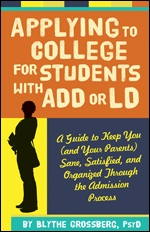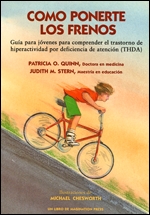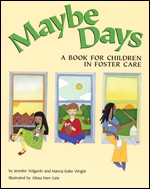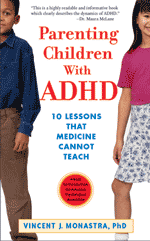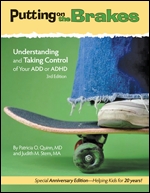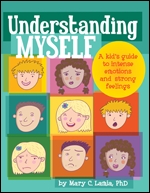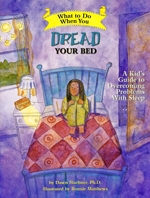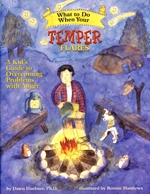Please find the below downloadable forms, information and resources for your convenience.
Downloadable Forms:
Resources:
Click on the book title to be redirected to the publisher’s website to view additional information and purchase the book.
The Everything Guide to Your Most Urgent Questions
By Patricia O. Quinn, MD
This is the essential handbook and comprehensive resource for college students with AD/HD. Bestselling author Dr. Pat Quinn answers the most common questions and tackles the most challenging problems students with AD/HD face in college.
Students will find compassionate, realistic, informed, and time-tested advice on how to design an academic program that really works and achieve life-school balance while managing AD/HD symptoms far away from home and parents. Detailed information on medication, relationships, and whether college is even right for you complete this guide and make AD/HD and the College Student the definitive guide for managing AD/HD.
By Blythe Grossberg, PsyD
Applying to College for Students With ADD or LD gives students easy-to-use guidelines and insider tips to make their college application process organized, effective, and less stressful.
This one-of-a-kind book is specifically tailored for teens with ADD or LD, and breaks down the application process into manageable steps–from determining personalized criteria for college and narrowing down college choices, to developing a strong portfolio and application, as well as asking for references, requesting financial aid, and preparing for interviews.
By Wendy L. Moss, PhD
Many kids struggle with low confidence. The good news is, Being Me can help kids tackle everyday challenges and build confidence and self-esteem.
This handy guide gives kids the tools they need to explore their strengths, feel successful, and be confident in school, with friends, and importantly, with themselves. Loaded with kid-relevant examples and easy-to-do tips and tricks, Being Me will empower kids to feel happier and more secure and confident with themselves and with everyone else in their lives.
By Patricia O. Quinn, MD and Judith M. Stern, MA
Illustrated by Michael Chesworth
A guide to understanding and gaining control over attention deficit hyperactivity disorder.
By Jennifer Wilgocki, MS and Marcia Kahn Wright, PhD
Illustrated by Alissa Imre Geis
Will I live with my parents again? Will I stay with my foster parents forever? For children in foster care, the answer to many questions is often “maybe.” Maybe Days addresses the questions, feelings, and concerns these children most often face. Honest and reassuring, it also provides basic information that children want and need to know, including the roles of various people in the foster care system and whom to ask for help. An extensive afterword for adults caring for foster children describes the child’s experience, underscores the importance of open communication, and outlines a variety of ways to help children adjust to the “maybe days”- and to thrive.
By Michael A. Tompkins, PhD and Katherine A. Martinez, PsyD
Illustrated by Michael Sloan
Anxiety can make everything seem unmanageable-from dealing with family and friends to managing schoolwork and extracurricular activities. It’s been estimated that between 9 and 15 million teens in the United States suffer from phobias, panic attacks, or extreme worry or anxiety. That’s a lot of teens!My Anxious Mindhelps teens take control of their anxious feelings by providing cognitive-behavioral strategies to tackle anxiety head-on and to feel more confident and empowered in the process.My Anxious Mindalso offers ways for teens with anxiety to improve their inter-personal skills, whether it be with friends, family, or teachers; manage stress; handle panic attacks; use diet and exercise appropriately; and decide whether medication is right for them.
By Vincent J. Monastra, PhD
Kids with ADHD need to be loved and shown how to become successful adults. Unfortunately, their lack of attention and restlessness often get in the way. Parents of these kids try so hard to stay connected and remain patient in the face of daily frustration. However, it is an incredible challenge to remain positive and involved when your child does not respond to the kinds of strategies that work for other children. Without guidance and systematic treatment, these bright, inquisitive children are unlikely to graduate from high school, are more prone to use illegal drugs, and struggle to maintain employment as adults.
Parenting Children With ADHD: 10 Lessons That Medicine Cannot Teach gives parents a framework for building a successful parenting program at home. Drawing from his experiences in evaluating and treating thousands of children and teens with ADHD, Vincent Monastra presents a series of ten lessons that are essential for promoting the success of kids with ADHD. In simple language, Monastra explains the causes of ADHD and how nutrition, medication and certain therapeutic procedures can improve attention, concentration, and behavioral control.
By Patricia O. Quinn, MD and Judith M. Stern, MA
Now in its 20th year of publication, Putting on the Brakes remains the essential go-to resource for kids, parents, and professionals looking for tips and techniques on managing attention disorders.
This third edition is updated and revised throughout with the latest info, resources, medication types, and glossary terms on ADHD. Written by two nationally recognized ADHD experts, Putting on the Brakes is loaded with practical ways to improve organizational, focusing, studying, and homework skills and contains more strategies for making friends, controlling emotions, and being healthy.
This book gives kids with ADHD the tools for success in and out of school and helps them to feel empowered to be the best they can be!
By Mary C. Lamia, PhD
Strong feelings and intense emotions are part of every pre-teens life. So why does something so common feel so overwhelming or embarrassing?
Understanding Myself is written especially for kids with intense emotions. Chock-full of current and relevant psychological research on emotions as well as real-life stories, useful quizzes and fun-fact boxes, Understanding Myself will encourage kids to notice just what their emotions are telling them about themselves, their friends, and their family.
This informative and practical guide will help kids know what do when their emotions get to be too much!
By Dawn Huebner, PhD
Illustrated by Bonnie Matthews
Nail biting. Thumb sucking. Hair twirling. Scab picking. Shirt chewing.
Do you have a habit that’s hard to stop? A habit that embarrasses you or gets you in trouble? If so, you’re not alone. Lots of kids have habits they wish they could lose. But habits are stronger than wishes. They lock on, holding you tight. Even if you want to break free, you can’t. Unless you have the keys.
What to Do When Bad Habits Take Hold provides the keys to escape from a variety of pesky habits. Engaging examples, lively illustrations, and step-by-step instructions teach essential habit-busting strategies, targeting everything from nail biting and thumb sucking to shirt chewing, hair twirling, and more. This interactive self-help book is the complete resource for educating, motivating, and empowering children to set themselves free.
By Dawn Huebner, PhD
Illustrated by Bonnie Matthews
Wouldn’t it be great if you could climb into bed, snuggle under your covers, and fall asleep without any fuss or fear? Without listening for noises or thinking about bad guys? Without an extra drink, or an extra hug, or an extra trip to the bathroom?
Bedtime is tough for many kids. If you’re a kid who dreads your bed, and you’re convinced that nothing short of magic will make nighttime easier, this book is for you.
What to Do When You Dread Your Bed guides children and their parents through the cognitive-behavioral techniques used to treat problems with sleep. Fears, busy brains, restless bodies, and overdependence on parents are all tackled as children gain the skills they need for more peaceful nights. This interactive self-help book is the complete resource for educating, motivating, and empowering children to fall asleep and stay asleep—like magic!
By Dawn Huebner, PhD
Illustrated by Bonnie Matthews
Did you know that life is like an obstacle course? It’s exciting and fun, but full of tricky spots to get through. If you’re a kid who feels so frustrated by those tricky spots that it’s hard to enjoy the good things in life, this book is for you.
What to Do When You Grumble Too Much guides children and their parents through the cognitive-behavioral techniques used to treat negative thinking. Lively metaphors and illustrations help kids see life’s hurdles in a new way, while drawing and writing activities help them master skills to get over those hurdles. And step-by-step instructions point the way toward becoming happier, more positive kids. This interactive self-help book is the complete resource for educating, motivating, and empowering children to work toward change.
Includes a Note to Parents and Caregivers by psychologist and author Dawn Huebner, PhD.
By Dawn Huebner, PhD
Illustrated by Bonnie Matthews
What to Do When You Worry Too Much is an interactive self-help book designed to guide 6–12 year olds and their parents through the cognitive-behavioral techniques most often used in the treatment of generalized anxiety. Metaphors and humorous illustrations make difficult concepts easy to understand, while prompts to draw and write help children to master new skills related to reducing anxiety.
Engaging, encouraging, and easy to follow, this book educates, motivates, and empowers children to work towards change. Includes a note to parents by psychologist and author Dawn Huebner, PhD.
By Dawn Huebner, PhD
Illustrated by Bonnie Matthews
Did you know that people have brain sorters that keep their brains from getting cluttered with unnecessary thoughts? Sometimes these brain sorters get mixed up, though, and brains get clogged with thoughts that really bother kids.
If that has happened to you, if it’s hard for you to feel safe or sure of yourself because certain thoughts have gotten stuck, this book is for you.
What To Do When Your Brain Gets Stuck guides children and their parents through the cognitive-behavioral techniques used to treat obsessive compulsive disorder. This interactive self-help book turns kids into super-sleuths who can recognize and more appropriately respond to OCD’s tricks.
With engaging examples, activities, and step-by-step instructions, it helps children master the skills needed to break free from OCD’s sticky thoughts and urges, and live happier lives. This What-to-Do Guide is the complete resource for educating, motivating, and empowering children to work toward change.
By Dawn Huebner, PhD
Illustrated by Bonnie Matthews
Did you know that anger is like fire? It starts with a spark, igniting us with energy and purpose. But it can also blaze out of control, causing lots of problems.
If you’re a kid whose temper quickly flares, a kid whose anger gets too big, too hot, too fast, this book is for you.
What to Do When Your Temper Flares guides children and their parents through the cognitive-behavioral techniques used to treat problems with anger. Engaging examples, lively illustrations, and step-by-step instructions teach children a set of “anger dousing” methods aimed at cooling angry thoughts and controlling angry actions, resulting in calmer, more effective kids. This interactive self-help book is the complete resource for educating, motivating, and empowering children to work toward change.




